
Frances Wright, widely known as Fanny Wright, was a Scottish-born lecturer, writer, freethinker, feminist, utopian socialist, abolitionist, social reformer, and Epicurean philosopher, who became a US citizen in 1825. The same year, she founded the Nashoba Commune in Tennessee as a utopian community to demonstrate how to prepare slaves for eventual emancipation, but the project lasted only five years.
The Third Great Awakening refers to a historical period proposed by William G. McLoughlin that was marked by religious activism in American history and spans the late 1850s to the early 20th century. It influenced pietistic Protestant denominations and had a strong element of social activism. It gathered strength from the postmillennial belief that the Second Coming of Christ would occur after mankind had reformed the entire Earth. It was affiliated with the Social Gospel movement, which applied Christianity to social issues and gained its force from the awakening, as did the worldwide missionary movement. New groupings emerged, such as the Holiness movement and Nazarene and Pentecostal movements, and also Jehovah's Witnesses, Spiritualism, Theosophy, Thelema, and Christian Science. The era saw the adoption of a number of moral causes, such as the abolition of slavery and prohibition.
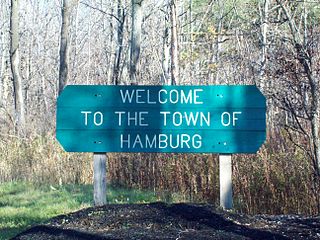
Hamburg is a town in Erie County, New York, United States. As of the 2010 census, the town had a population of 56,936. It is named after the city of Hamburg, Germany. The town is on the western border of the county and is south of Buffalo. Hamburg is one of the Southtowns in Erie County. The villages of Hamburg and Blasdell are in the town. The town of Hamburg was founded in 1812 in Armor.

Mary Church Terrell was one of the first African-American women to earn a college degree, and became known as a national activist for civil rights and suffrage. She taught in the Latin Department at the M Street School —the first African American public high school in the nation—in Washington, DC. In 1895, she was the first African-American woman in the United States to be appointed to the school board of a major city, serving in the District of Columbia until 1906. Terrell was a charter member of the National Association for the Advancement of Colored People (1909) and the Colored Women's League of Washington (1892). She helped found the National Association of Colored Women (1896) and served as its first national president, and she was a founding member of the National Association of College Women (1923).

The history of Memphis, Tennessee and its area began many thousands of years ago with succeeding cultures of indigenous peoples. In the first millennium, it was settled by the Mississippian culture. The Chickasaw Indian tribe emerged about the 17th century, or migrated into the area. The earliest European exploration may have encountered remnants of the Mississippian culture by Spanish explorer Hernando de Soto. Later French explorers led by René-Robert Cavelier, Sieur de La Salle likely encountered the Chickasaw. The European-American city of Memphis was not founded until 1819. The city was named after the ancient capital of Egypt on the Nile River in North Africa. It rapidly developed as a major trading center for cotton cultivated at the region's large plantations and dependent on the work of enslaved African Americans. In the 19th century, and especially 1878 and 1879, the city suffered severe yellow fever epidemics. In 1878 tens of thousands of residents fled and more than 5,000 died, with hundreds more dying in the next year's epidemic, causing the city to go bankrupt and give up its charter until 1893.

The Museum of Science & History - Pink Palace in Memphis, Tennessee, serves as the Mid-South's major science and historical museum and features exhibits ranging from archeology to chemistry. Over 240,000 people visit the museum each year.
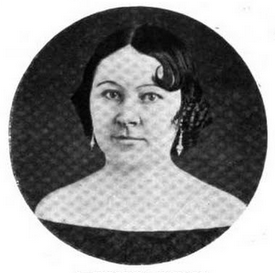
Lucy Virginia French was a 19th-century American author and poet from Virginia. Her blank verse was considered especially strong, and her themes were well chosen, mostly in their measure. she belonged to a cultured and wealthy family. Educated at Washington, Pennsylvania, she moved to Memphis, Tennessee, where she lived until her marriage in 1853, to John Hopkins French, living after this at "Forest Home," near McMinnville, Tennessee. Her first volume of poems, "Wind Whispers," appeared in 1856. She wrote "Tecumseh's Foot," "The Great River," "The Lyre of Time," "The Palmetto and the Pine," "The Years," "Mammy," "Liberty Bells," and other poems, besides several novels and dramas. She took a keen interest in the political questions of the day and wrote about them. Her first novel, "My Roses," appeared in 1872, and her last one, "Darlingtonia," in 1879. Between the years 1856 and 1879, she was actively engaged as literary editor of a number of magazines and newspapers. She wrote under the name L'Inconnue. Among her friends were James Russell Lowell, Henry Wadsworth Longfellow, Oliver Wendell Holmes Sr., John Greenleaf Whittier, and William Cullen Bryant.

Anne Dallas Dudley was an American activist in the women's suffrage movement. She was a national and state leader in the fight for women's suffrage who worked to secure the ratification of the 19th Amendment in Tennessee. After founding the Nashville Equal Suffrage League and serving as its president, she moved up through the ranks of the movement, serving as President of the Tennessee Equal Suffrage Association and then as Third Vice President of the National American Woman Suffrage Association, where she helped lead efforts to get the Nineteenth Amendment to the US Constitution ratified, giving women the right to vote nationwide. She is especially noted for her successful efforts to get the Nineteenth Amendment ratified in her home state of Tennessee, the final state necessary to bring the amendment into force.

Elizabeth Avery Meriwether was an American author and an activist in the suffrage movement.
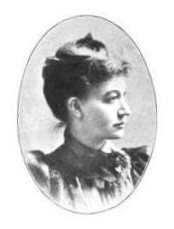
Margaret Elizabeth Crozier French was an American educator, women's suffragist and social reform activist. She was one of the primary leaders in the push for women's rights in Tennessee in the early 1900s, and helped the state become the 36th state to certify the 19th Amendment to the United States Constitution, giving women the right to vote, in 1920. She also founded the Ossoli Circle, the oldest federated women's club in the South, and led efforts to bring coeducation to the University of Tennessee.

Temple Israel is a Reform Jewish congregation in Memphis, Tennessee, in the United States. It is the only Reform synagogue in Memphis, the oldest and largest Jewish congregation in Tennessee, and one of the largest Reform congregations in the U.S. It was founded in 1853 by mostly German Jews as Congregation B'nai Israel. Led initially by cantors, in 1858 it hired its first rabbi, Jacob Peres, and leased its first building, which it renovated and eventually purchased.
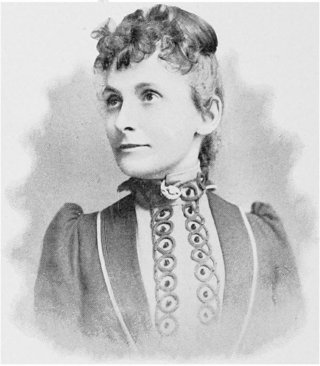
Annah Robinson Watson (1848–1930) was an American author, the founding member and president of the Nineteenth Century Club, and a collector of American folklore.

Women's suffrage was established in the United States on a full or partial basis by various towns, counties, states and territories during the latter decades of the 19th century and early part of the 20th century. As women received the right to vote in some places, they began running for public office and gaining positions as school board members, county clerks, state legislators, judges, and, in the case of Jeannette Rankin, as a member of Congress.

Lilian Wyckoff Johnson was an American teacher of history and an advocate for rural reform and civil rights.
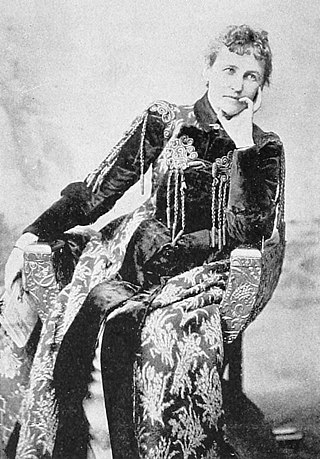
Clara Conway was an American teacher and political activist. She founded the Clara Conway Institute for Girls in Memphis, Tennessee and was a founding member of the Nineteenth Century Club in 1890.
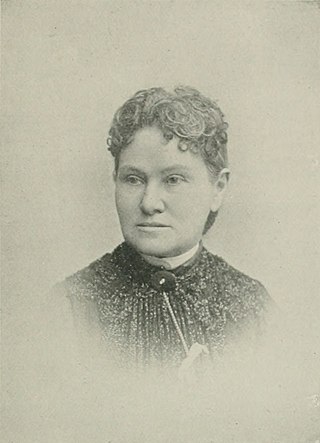
Elizabeth Lyle Saxon was a writer and a late 19th and early 20th century advocate of women's rights. She reached national recognition as one of the key pioneer suffragettes of the South, making numerous appeals to the federal government to recognize women's right to vote.
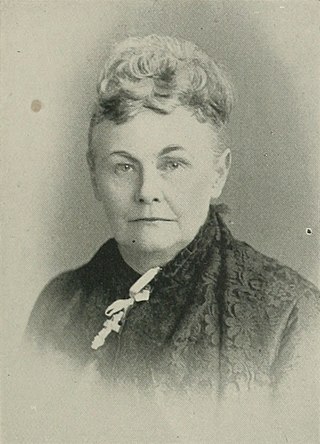
Lide Smith Meriwether was a leader of the first generation of feminists and women's rights activists. She lobbied for prohibition, raising the legal age of consent, and woman's suffrage. Meriwether was president of the Tennessee Woman's Christian Temperance Union (WCTU) from 1884 to 1897, and then as an honorary president for life. In 1889, she organized the first Equal Rights Association in Memphis, and served as president of the Tennessee Equal Rights Association from 1897 to 1900, and subsequently was made honorary president for life.

The woman's club movement was a social movement that took place throughout the United States that established the idea that women had a moral duty and responsibility to transform public policy. While women's organizations had always been a part of United States history, it was not until the Progressive era that it came to be considered a movement. The first wave of the club movement during the progressive era was started by white, middle-class, Protestant women, and a second phase was led by African-American women.

The Rowland J. Darnell House is a historic mansion in Memphis, Tennessee, United States. It was built in 1907 for Rowland Jones Darnell, a lumber dealer from the North. By 1917, it had been acquired by the hardware dealer A. R. Orgill, followed by another hardware dealer named Leslie Martin Stratton from 1919 to 1924. It was purchased by The Nineteenth Century Club in 1926.
George Reade was a prominent landowner, military officer, judge, and politician who served as a member of the House of Burgesses and as Acting Governor of Virginia Colony. He is the great-great-grandfather of the first President of the United States, George Washington.


















